The Advantages of Rock Wool Sandwich Panels
When constructing a building intended for public use, the insulation chosen must meet higher fire safety standards to ensure occupant safety. In addition to providing effective thermal insulation, rock wool sandwich panels are notable for their fire resistance.
Comprising two metal facings and a rock wool core, they combine the durability of sandwich panels with the acoustic and non-combustible properties of rock wool. These panels are used in various sectors, such as residential, commercial, and industrial buildings, and are a popular solution for meeting public building regulations.

What is Rock Wool?
Rock wool is a natural insulating material made from basalt, a type of volcanic rock. To produce rock wool, the stone is heated to around 1500°C until it melts. The molten material is then spun or blown into fibres, similar to how candy floss is made. These fibres are then bound to form insulating blocks or rolls, which are used in rock wool sandwich panels, such as the Vulcasteel panels by Joris Ide.
Characteristics of Rock Wool Sandwich Panels
Rock wool sandwich panels consist of two steel sheets and a rock wool insulating core. This design offers several distinct advantages:
- A complete solution offering quick installation and multiple performance benefits
- Strong mechanical durability
- Excellent water resistance after installation
- High fire protection
- Improved acoustic comfort
Types of Panels: Examples like the JI Vulcasteel Wall and JI Vulcasteel Roof (including the JI Vulcasteel Roof 37-500-1000) demonstrate the range of products available for various construction applications.
Acoustic Performance and Fire Safety
Thanks to the properties of rock wool, sandwich panels incorporating this material offer noise reduction of around 30 dB. When the inner face is perforated, rock wool sandwich panels significantly reduce sound reverberation, with an absorption index reaching as high as 0.85. These features are especially valued in noisy environments or for buildings located in areas with high noise pollution.
Most rock wool panels are non-combustible and can achieve high fire resistance ratings, such as EI60 for 100 mm thicknesses and up to EI120 for 200 mm thicknesses, depending on installation conditions. These panels comply with stringent fire safety regulations in the UK.
Thus, rock wool sandwich panels offer both superior acoustic comfort and enhanced fire safety.

Durability of Rock Wool Sandwich Panels
These panels are designed to last. They withstand weather conditions, temperature fluctuations, and humidity, ensuring a long lifespan without any loss of performance. The density of rock wool (approximately 100 kg/m³) ensures high dimensional stability and mechanical strength, contributing to the longevity of installations.
Environmental Aspects of Rock Wool
Rock wool is made from volcanic rock, a naturally abundant material. It is recyclable and helps improve building energy performance by reducing the need for heating and cooling, which can lower energy consumption and related emissions.
